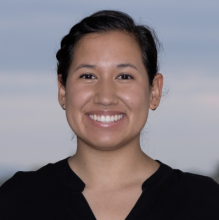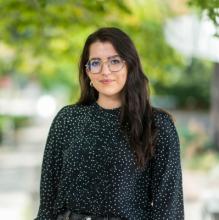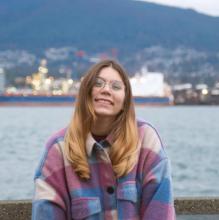I decided to pursue a graduate degree because I believe that knowledge is power, and I wanted to contribute to the public mobilization and collaborative generation of knowledge. I am also passionate about how we educate the next generation of leaders and thinkers and have been grateful for the teaching and curriculum development opportunities I have been afforded at UBC.
Research Description
Many young adult learners are looking toward an increasingly uncertain future. ‘Wicked problems’ like the climate crisis, growing social and economic inequality, and deepening political polarization are widening the chasm between the world young people desire, and the world they will inherit. The profession of urban planning is well-positioned to support youth in reclaiming agency over their future, as planners operate within current structural conditions to address wicked problems. Planners often play an intermediary role between the citizenry and the government through participatory planning initiatives, like workshops or townhalls, and then synthesize the perspectives of the citizenry into a proposal they present to decision-makers. However, youth are often underrepresented in participatory planning venues. Their exclusion often stems from feeling disenfranchised with the political and planning system, being unsure about how their voice gets translated into policy, and feeling powerless and unwelcome in decision-making spaces. Given their longer-term future, when youth do participate, they tend to bring long-term visioning, suggesting their contributions might bring more foresight to the decision-making table. My work through the Public Scholars Initiative hands the microphone to youth to ask, how should planners and policymakers include youth in decision-making processes? Through a workshop series delivered in collaboration with the youth-led organization, CityHive, our research generates and distributes youth-generated alternative modes of civic engagement, that are designed to include and amplify youth perspectives in directing the future of our communities. Having delivered the workshop series, we are now creating a Zine that policymakers can use as a tool in designing youth-inclusive engagement processes.
What does being a Public Scholar mean to you?
Being a public scholar makes community-engaged research at the Doctoral level possible. Building relationships with community organizations takes time, and importantly, asks for community partner’s valuable time. With the financial support from the Public Scholars Initiative, I am able to financially recognize the time and insight CityHive provides to this project. Financial support has enabled us to deliver the workshops, from catering to honoraria, and mobilize the knowledge we generated by hiring a graphic designer to create a Zine. Doing community-engaged work often means focusing on the ‘little things’, like catering, art supplies, and booking welcoming spaces to gather. Being a public scholar makes the little things - which have a huge impact - possible.
In what ways do you think the PhD experience can be re-imagined with the Public Scholars Initiative?
In entering the PhD program, it was commonplace to hear that ‘the PhD is a lonely experience’. In bringing together a cohort of interdisciplinary early-career researchers from across UBC, the PSI helps to build relationships on the basis of challenging norms of the PhD, while being supported in conducting research. I feel grateful and privileged to be part of such a community. Building relationships carries through in how research is executed, as the PSI supports research designs that center and follow the lead of the community of collaboration. In activating collaborative activities within the PSI cohort, and the work Public Scholars do, more voices are engaged in finding solutions to pressing challenges. The more multiplicity we have in our approaches to conducting research, the more solutions we can reveal together.
How do you envision connecting your PhD work with broader career possibilities?
Mobilizing knowledge in avenues and formats that the wider public can engage with is core to my philosophy as a researcher. With support from the PSI, my collaborative PhD work is represented in an arts-based format, a Zine, that is written and designed for public use. Collaboratively creating this Zine has taught me a lot about concisely presenting findings, visualizing data, and managing a team to translate knowledge into art. In my future work, I hope to leverage these learned skills to continue mobilizing knowledge beyond academic norms. Beyond knowledge mobilization, I hope to continue a career in community-engaged research that further expands the inclusion of diverse publics in civic engagement processes, while also bridging the university and the community it resides in through community-engaged learning instruction.
How does your research engage with the larger community and social partners?
My research currently engages with young adults who are passionate about expanding civic engagement spaces, and CityHive, a local youth-led organization that shares this mission. Working with CityHive has been a delight, and I’m excited to continue our collaboration, and continue advocating for the inclusion of young voices in decision-making processes.
Why did you decide to pursue a graduate degree?
Higher education is increasingly critiqued for speaking in siloes and gatekeeping knowledge that can considerably improve well-being and conviviality in society. But, many universities like UBC are committed to challenging that narrative by improving the public contribution of academic scholarship. I decided to pursue a graduate degree because I believe that knowledge is power, and I wanted to contribute to the public mobilization and collaborative generation of knowledge. I am also passionate about how we educate the next generation of leaders and thinkers and have been grateful for the teaching and curriculum development opportunities I have been afforded at UBC.
Why did you choose to come to British Columbia and study at UBC?
I chose to study at the University of British Columbia, in part, because of the university’s commitment to its wider community, most importantly, the Musqueam, Squamish, and Tsleil-Waututh Nations who have been the caretakers of these lands for millennia. While there remain strides to be made, UBC is one of the leaders in carving a path toward reciprocity between the university and the community. Beyond UBC’s commitment to reconciliation, and engaged scholarship and instruction, my department, the School of Community and Regional Planning has been an intellectually enriching place to learn. With leading thinkers in the ‘transformative’ planning tradition, I have been fortunate to have mentors and colleagues whose ideas continue to challenge and propel my scholarship.




